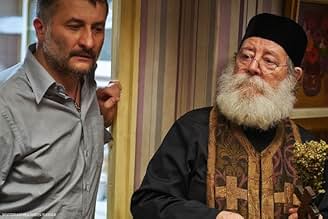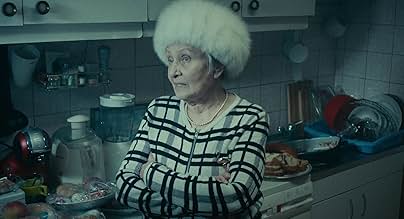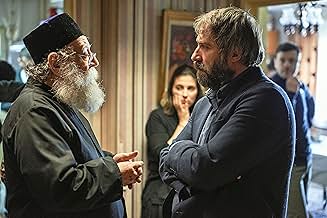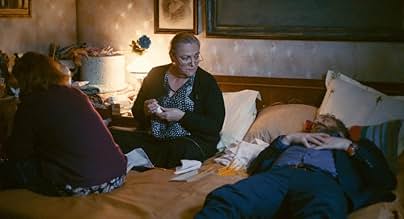Sieranevada
- 2016
- Tous publics
- 2h 53m
IMDb RATING
7.3/10
6K
YOUR RATING
Centers around a family gathering on the anniversary of a patriarch's recent death.Centers around a family gathering on the anniversary of a patriarch's recent death.Centers around a family gathering on the anniversary of a patriarch's recent death.
- Awards
- 21 wins & 21 nominations total
- Director
- Writer
- All cast & crew
- Production, box office & more at IMDbPro
Featured reviews
There are two things you need to be willing to embrace before you watch this film. First, the film is not going to make the connections between the characters easy for you. If you are a lazy viewer who is not paying close attention to the dialogue or you do not grasp the connections between the various dramas that are played out, you might be frustrated with what superficially appears to be a lack of direction and feel the film is "pointless". Second, the film is EXTREMELY Eastern European in character. If you want a Hollywood ending you will not find it here.
However, I simply love films like this that propel you into a difficult family situation and spend most of the film time there, allowing you to try to figure out for yourself what's going on. "The Godfather" is one example; I was also a huge fan of Roman Polanski's "Carnage". For people who like that kind of thing this film is a huge treat. It is only at the very end, after the slightly odd car monologue by the main character, that you really feel satisfied with what the film has accomplished and that you have come to understand a subtle coherence within the mess of individual failed narratives. Every character in this film is a self-actualized, 21st century individual who has come up with their own personal story about how the world works. The film's plot makes that obvious, but the remaining questions are up to you: where are the lies? Where is the truth? What happens to the main character at the end? This is a rather beautiful puzzle to behold.
However, I simply love films like this that propel you into a difficult family situation and spend most of the film time there, allowing you to try to figure out for yourself what's going on. "The Godfather" is one example; I was also a huge fan of Roman Polanski's "Carnage". For people who like that kind of thing this film is a huge treat. It is only at the very end, after the slightly odd car monologue by the main character, that you really feel satisfied with what the film has accomplished and that you have come to understand a subtle coherence within the mess of individual failed narratives. Every character in this film is a self-actualized, 21st century individual who has come up with their own personal story about how the world works. The film's plot makes that obvious, but the remaining questions are up to you: where are the lies? Where is the truth? What happens to the main character at the end? This is a rather beautiful puzzle to behold.
Throughout history, the seventh art, with its hundred-year history, has seen many twists and turns, it has been taken from various small cultural and artistic movements until a large number of them carry the history of cinema on their shoulders, various companies and their constant policies, geographical determinism and various wars have subjected this field to it.
One of these factors is the various cultural movements.
Whether they like it or not, movements are always happening throughout the history of art, even in other human lives, sometimes with the speed of lightning and sometimes like the last turbulent sea.
The Romanian New Wave is one of those cultural movements, especially in film, that moves slowly in terms of its connection to the plots and internal atmosphere of its films, but like the last ones, it is angry, roaring and criticizing.
The theme of this wave, which began in the first decade of the 21st century, is to slowly portray social events to us, and it is so realistic that we watch scenes from last night's party with our relatives and relatives, or, for example, a scene of something that happened to a sister or brother, that's how it is and does it. There is a period of cinema in between that includes storytelling in the heart of simple everyday events and invites us to identify with them to such an extent, but perhaps what makes Romanian New Wave cinema special is its closeness to realism and its fearlessness, and it can be more glorious in stories that can be in real cinema.
The plot is probably less popular with cinema audiences because of the very area in which it shows its films, directors whose films are similar to theirs, both in terms of form and content and narrative, can be found in corners of world cinema - all of which are separated from mainstream cinema, with slow, bold plots and what might happen. They bring their script to the film, which truly shapes the entirety of Romanian New Wave films, with these tools and creative texts and subtexts, in the following years, a step towards establishing this medium in terms of the problems of living conditions, political and social conditions, problems of family life and especially and the exploration of human morality.
Romanian New Wave cinema is the movement of the camera on the hand in the hallways and rooms of apartment buildings in order to show everyday events, the cinema is the cinema of showing the chatter and conversation of people around the dinner table, the cinema of rape of the individual and the way he deals with this issue, it is a film that every country can understand because it cannot understand a person at all because it makes a person more.
Minimal space, bright colors and dark nights, scripts full of dialogue and monologues, and the camera being in the flow and instability of events, whose very instability has also created stability for itself.
Siranvada, along with other important works by several directors of this movement, is one of the most seen works of this wave, along with masterpieces such as "4 Months, 3 Weeks and 2 Days" or "Graduation Party", both of which can be attributed to Cristian Mongeau, who was made by Cristian Puio, and both of these directors had an impact on the formation of this movement.
Siranvada falls short of the important works of the Romanian New Wave because, in addition to being an average and correct film, it also has the theme and cinema of the New Wave within it, and with its minimalist atmosphere, it also gives you a special mood, tells the stories of different people and always tells about different arguments and discussions, although you may use different plots. It will captivate the audience.
There are stories of different people who have gathered together on the occasion of the fortieth anniversary of the death of one of their relatives and want to hold a party...
One of these factors is the various cultural movements.
Whether they like it or not, movements are always happening throughout the history of art, even in other human lives, sometimes with the speed of lightning and sometimes like the last turbulent sea.
The Romanian New Wave is one of those cultural movements, especially in film, that moves slowly in terms of its connection to the plots and internal atmosphere of its films, but like the last ones, it is angry, roaring and criticizing.
The theme of this wave, which began in the first decade of the 21st century, is to slowly portray social events to us, and it is so realistic that we watch scenes from last night's party with our relatives and relatives, or, for example, a scene of something that happened to a sister or brother, that's how it is and does it. There is a period of cinema in between that includes storytelling in the heart of simple everyday events and invites us to identify with them to such an extent, but perhaps what makes Romanian New Wave cinema special is its closeness to realism and its fearlessness, and it can be more glorious in stories that can be in real cinema.
The plot is probably less popular with cinema audiences because of the very area in which it shows its films, directors whose films are similar to theirs, both in terms of form and content and narrative, can be found in corners of world cinema - all of which are separated from mainstream cinema, with slow, bold plots and what might happen. They bring their script to the film, which truly shapes the entirety of Romanian New Wave films, with these tools and creative texts and subtexts, in the following years, a step towards establishing this medium in terms of the problems of living conditions, political and social conditions, problems of family life and especially and the exploration of human morality.
Romanian New Wave cinema is the movement of the camera on the hand in the hallways and rooms of apartment buildings in order to show everyday events, the cinema is the cinema of showing the chatter and conversation of people around the dinner table, the cinema of rape of the individual and the way he deals with this issue, it is a film that every country can understand because it cannot understand a person at all because it makes a person more.
Minimal space, bright colors and dark nights, scripts full of dialogue and monologues, and the camera being in the flow and instability of events, whose very instability has also created stability for itself.
Siranvada, along with other important works by several directors of this movement, is one of the most seen works of this wave, along with masterpieces such as "4 Months, 3 Weeks and 2 Days" or "Graduation Party", both of which can be attributed to Cristian Mongeau, who was made by Cristian Puio, and both of these directors had an impact on the formation of this movement.
Siranvada falls short of the important works of the Romanian New Wave because, in addition to being an average and correct film, it also has the theme and cinema of the New Wave within it, and with its minimalist atmosphere, it also gives you a special mood, tells the stories of different people and always tells about different arguments and discussions, although you may use different plots. It will captivate the audience.
There are stories of different people who have gathered together on the occasion of the fortieth anniversary of the death of one of their relatives and want to hold a party...
It is a film too long and too boring. Too many characters in a space too small. All moves back and forth in a permanent and annoying tangle. Even the film's title is without sense and misspelled. The idea is to depict the miserable appearance of the Romanian people so it is very realistic. Another finding about the level of decay that we reached now in Romania. I appreciate his many actors even those appearing in supporting roles. It thought the sound was not well done; dialogues in Romanian language are not perfectly understandable, but of course it may depend on the cinema. We also appreciated the collaboration between filmmakers from so many countries.
This is definitely a carefully crafted movie by a gifted director.
The result is disappointing though: way too long.
I enjoyed the fact that it captures real conflicts and emotions.
Could have done that in half the time though.
Good film for movies snobs.
The result is disappointing though: way too long.
I enjoyed the fact that it captures real conflicts and emotions.
Could have done that in half the time though.
Good film for movies snobs.
Wow, wow, wow, did I say wow? Wow!
How can three hours of movie go so fast? the movie in itself is very local, but so human, so for people acquainted with the old ways in the Eastern Europe region, this is very evocative.
Everyone, will find a character to like, and one to despise, one too similar to him, and one so dissimilar, that it hurts. Unfortunately I'm a national, and can't figure if the translations make it right, but for sure the dialogue, looks like a stage of 12 Angry Men (this time more like 15), exposing the back bone of a life time at the Paradise's gates.
Sure there are quite a few good movies on the theme, but not many filmed 90% in 500 square feet. So the feeling of being there is so real.
Unfortunately if the first hour eats your interest, I can understand how other people got bored, where I got so excited. Thought the reality of characters is very crisp, almost to the point I can say - that is uncle A, that's Grandpa', and that's Aunt M.
So if you want to get your head spinning, to feel momentary hate for some characters otherwise benign at other points, and wanting to get real exposure to end-of-Communism Romanian urban life. This is it!
How can three hours of movie go so fast? the movie in itself is very local, but so human, so for people acquainted with the old ways in the Eastern Europe region, this is very evocative.
Everyone, will find a character to like, and one to despise, one too similar to him, and one so dissimilar, that it hurts. Unfortunately I'm a national, and can't figure if the translations make it right, but for sure the dialogue, looks like a stage of 12 Angry Men (this time more like 15), exposing the back bone of a life time at the Paradise's gates.
Sure there are quite a few good movies on the theme, but not many filmed 90% in 500 square feet. So the feeling of being there is so real.
Unfortunately if the first hour eats your interest, I can understand how other people got bored, where I got so excited. Thought the reality of characters is very crisp, almost to the point I can say - that is uncle A, that's Grandpa', and that's Aunt M.
So if you want to get your head spinning, to feel momentary hate for some characters otherwise benign at other points, and wanting to get real exposure to end-of-Communism Romanian urban life. This is it!
Did you know
- TriviaThe title, deliberately misspelled, is a parody of esoteric film titles and does not refer to anything specific.
- Crazy creditsSilvia Nastase is credited in the opening titles but not in the end credits.
- ConnectionsReferences Blanche-Neige et les Sept Nains (1937)
- SoundtracksSymphony in C minor J-C 9, I. Allegro
Composed by Giovanni Battista Sammartini
Performed by Aradia Ensemble
Conducted by Kevin Mallon
Courtesy of Naxos Deutschland GmbH
- How long is Sieranevada?Powered by Alexa
Details
- Release date
- Countries of origin
- Official site
- Language
- Also known as
- Сьєраневада
- Filming locations
- Strada Ionel Perlea, Bucharest, Romania(Opening scene: Lary's street)
- Production companies
- See more company credits at IMDbPro
Box office
- Budget
- €1,400,000 (estimated)
- Gross worldwide
- $247,196
- Runtime
- 2h 53m(173 min)
- Color
- Aspect ratio
- 1.85 : 1
Contribute to this page
Suggest an edit or add missing content























